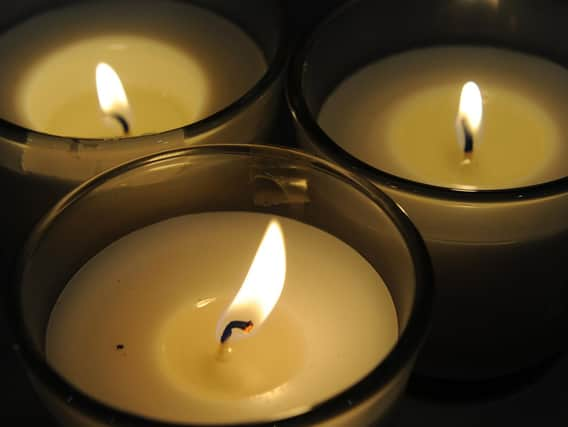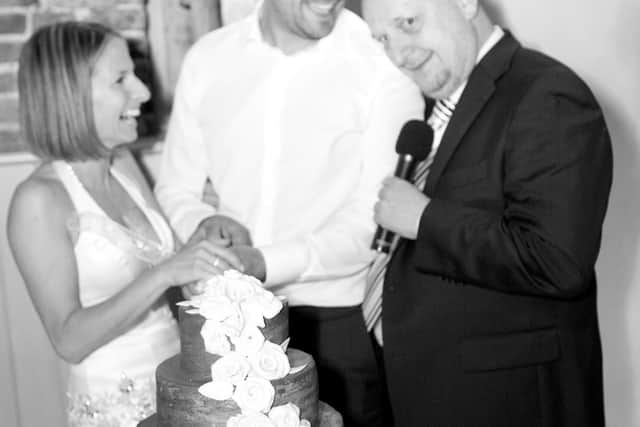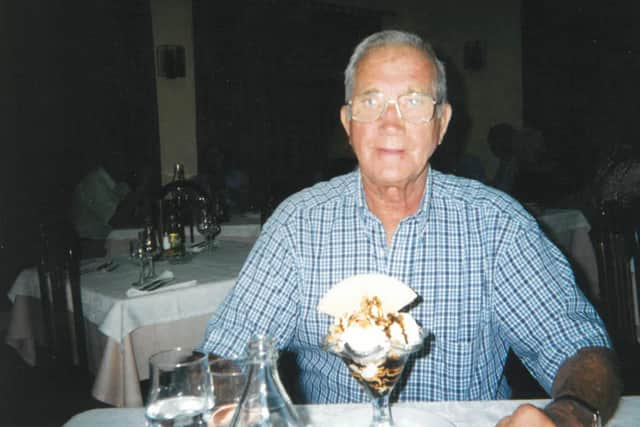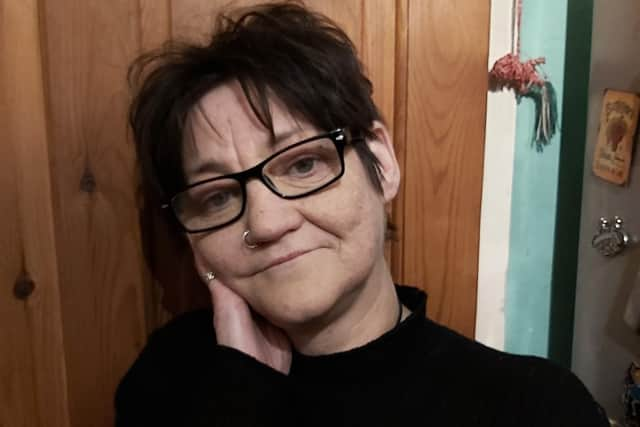Yorkshire families pay tribute to the loved ones they have lost to coronavirus as a year is marked since the first UK cases


In Yorkshire there have been over 10,000 deaths, many of whom died in hospital with no loved one by their side in their last moments.
Now, almost a year since the WHO declared the pandemic, thousands of Yorkshire families are learning to live with the grief left behind.
Advertisement
Hide AdAdvertisement
Hide AdMark Barnett was among the first in Yorkshire to succumb to coronavirus, and died aged 65 on April 1 last year after becoming seriously ill in March. He is survived by his wife, Lyn.
He is remembered by his family and friends for his compassion, talent, and “appalling sense of humour”.
The father-of-four was a retired headteacher who, in his final years, gave so much to Selby Foodbank as its volunteer manager.
His sister, Julia Stebbing, said: “I could lean on him. He was terrific at the foodbank, when we went away together he was always on the phone to people who needed the foodbank.
“He was a can-do and did-do person.


Advertisement
Hide AdAdvertisement
Hide Ad“We will never know how many he helped. He didn’t shout about it.
“He always said you can’t help the world, but you can help one person.”
His close friend Nigel Currey, deputy manager of Selby Foodbank, remembers the day he met Mr Barnett. He said: “From the moment we met, he was a larger-than-life character.
“We became very, very good friends and he called me his dad.


Advertisement
Hide AdAdvertisement
Hide Ad“He just couldn’t stop, the foodbank would open three days a week but Mark would be around on other days. When the doors closed for the day of the foodbank, Mark would take clients out for a meal if they needed it.
“He treated everybody in the same kind of way.
“He was a very compassionate person. It became a way of life for him, rather than something that was just an organisation for him to manage.”
“It’s a major loss to us.”


Under Mr Barnett’s management, the foodbank quadrupled its provision for Selby residents in need.
Mr Barnett was unable to have visitors in his last days and died after being unsuccessfully treated on a ventilator without his family by his bedside.
Advertisement
Hide AdAdvertisement
Hide AdMs Stebbing said: “We weren’t able to go to the funeral, we weren’t able to travel at that time.
“I just accepted it. It was upsetting as we’re Jewish and you are supposed to be buried quickly in our faith. There was a back-log to wait for the funeral.
“Mark’s children have bought a bench in his name. Everyone copes in their own way, it was devastating.
“I miss him, that’s all. I really miss him.”
The chance able to nurse a loved one through their final days has been denied to thousands of families across the region over the past year.
Advertisement
Hide AdAdvertisement
Hide AdSo Francesca Robinson, 32, a teacher from Wakefield, feels lucky that she was able to take care of her grandfather Eric after he tested positive for coronavirus.
Mr Robinson, a former fish and chip shop owner from Morley, died in November after both he and his wife caught the virus.
He was 94-years-old and is remembered by his granddaughter as a “classic family man.”
Miss Robinson and her mother, Pam, nursed Mr Robinson in his home in his final days.
They both also contracted the virus but have now recovered.
Miss Robinson said: “Grandad was an incredible family man.
Advertisement
Hide AdAdvertisement
Hide Ad“His passion was watching his grandsons play rugby and his daughters ballroom dancing. He went all round the country and spent many, many weekends at Blackpool Tower.
“He had been with my nanna since they were sixteen, and they were married for 74 years.”
Mr Robinson, who lived in supported housing with his wife, Joyce, was diagnosed with double pneumonia in November, and later tested positive for covid. The father-of-two and grandfather-of-four made his wishes clear to his family that he did not want to be taken into hospital.
Miss Robinson said: “We took the decision that me and my Mum would nurse him.
“It was one of the hardest but loveliest times of my life.
Advertisement
Hide AdAdvertisement
Hide Ad“He started to go downhill. We were lucky that there were nurses on site, we had an amazing nurse called Libby.”
“In the nicest possible way, we were privileged that we got to be with him.
“A lot of people don’t get the luxury we had. Yes, we were locked in a flat, but we were privileged that we could have the honour to be with him.”
Mr Robinson died on November 18. Like thousands of others across the region, his family were forced to organise a small, socially-distanced funeral service.
Advertisement
Hide AdAdvertisement
Hide AdMiss Robinson said: “We could only have sixteen at the funeral, but a lot of people came outside to pay their respects.
“We pulled chairs together inside the crematorium to sit in couples. You can’t expect people to sit on their own two metres apart at a funeral.”
For some families, the loss of a loved one has left them with unanswered questions, and are demanding the government urgently launches its inquiry into the pandemic.
When Jayne Taylor-Broadbent met her wife Julie for the first time on a train platform ten years ago she said it was “love at first sight.”
Advertisement
Hide AdAdvertisement
Hide AdThe couple were married three years later in 2014 at St Ninian’s Church in west Hull, and spent many happy weekends together holidaying in Whitby and taking care of their beloved grandchildren and step-grandchildren.
But in May last year their life together was cut short when Julie Taylor-Broadbent, a former social care worker, died in Hull Royal Infirmary after being rushed in with a burst ulcer and then developing covid symptoms. She was just 49 years old and died four days shy of her 50th birthday.
Jayne Taylor-Broadbent, 55, remembers her wife, a mother-of-one and grandmother-of-two, as being “one of a kind, totally unique.”
She said: “As soon as anyone met Julie, she took an interest in them.
“You’d think you’d been friends forever.
Advertisement
Hide AdAdvertisement
Hide Ad“She had a wonderful way of engaging with people, showing kindness and empathy.
“Our wedding day was the happiest day of our lives.
“A wonderful Sunday afternoon to us was a walk around Hull’s art galleries or museum and then to the local pub to hear live music.
“We’d moved to the grandma part of our life, and her grandchildren just emulated Julie.
“She was so much fun, a big kid at heart.”
The couple followed lockdown rules strictly, and Julie was upset that she was unable to hold her newest grandson Oliver. A few weeks into lockdown, Julie fell unwell and was rushed to Hull Royal Infirmary where it was found she’d burst a stomach ulcer.
Advertisement
Hide AdAdvertisement
Hide AdShe began to recover but a few days after being admitted, she started to struggle with breathing difficulties and was taken to intensive care.
Julie tested negative for coronavirus three times, but doctors and nurses at the hospital told Jayne that they were treating her as a positive case and that her tests were likely to have been false negatives.
When it became clear that Julie would not recover, and she agreed with her medical team to withdraw oxygen treatment, Jayne was able to visit the hospital to say goodbye
She said: “They took me onto the ward where she was on 100 per cent oxygen. She could hear me but she couldn’t speak to me, it was too much of an effort for her.
“But she could hold my hand, and I could talk to her.
Advertisement
Hide AdAdvertisement
Hide Ad“She was struggling and in so much pain to get air into her lungs.
“I told her how much I loved her, and that she was the love of my life. She could squeeze my hand.”
Julie died in her wife’s arms minutes after her oxygen mask was removed.
Neighbours lined the streets and clapped to pay respects to her on the day of her funeral, which was taken by the same vicar who had married her and Jayne.
Advertisement
Hide AdAdvertisement
Hide AdJayne has now joined pressure group Covid 19 Bereaved Families For Justice who are campaigning for a full public inquiry into the pandemic.
She said: “I want a public inquiry and it needs to be an immediate one.
“It’s been so badly mishandled, so lacking in protecting people.
“We didn’t lock down soon enough or hard enough.
“We seemed to just want to get back to normality as soon as possible.
Advertisement
Hide AdAdvertisement
Hide Ad“Things like Eat Out to Help Out and pubs reopening just spread the disease and it was so blatantly obvious it was going to happen.
“People like Julie and the others were collateral damage - it was worth it just to kick-start the economy. The government put money before lives.
“We were promised a world-beating test, track and trace system and it’s still not there.
“Local authorities have just been pushed to one side. They should be given more chance to contribute, they know their areas.
Advertisement
Hide AdAdvertisement
Hide Ad“A public inquiry would highlight all these missed opportunities. I don’t want to blame the government but I do want them to be held accountable.
“I want answers for why I lost Julie. They say if we locked down earlier, 20,000 lives could have been saved.
“One of those could have been Julie. Blaming somebody isn’t going to bring her back but holding someone accountable will save lives.”
Comment Guidelines
National World encourages reader discussion on our stories. User feedback, insights and back-and-forth exchanges add a rich layer of context to reporting. Please review our Community Guidelines before commenting.